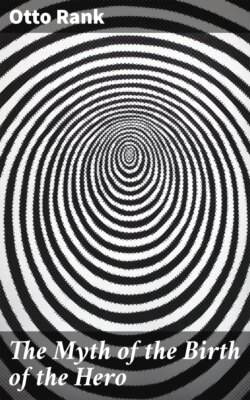Читать книгу The Myth of the Birth of the Hero - Ранк Отто - Страница 6
На сайте Литреса книга снята с продажи.
Karna
ОглавлениеTable of Contents
A close relationship with the Sargon legend is also shown in certain features of the ancient Hindu epic [32] Mahâbháràta, of the birth of the hero Karna. The contents of the legend are briefly rendered by Lassen (“Indische Altertumskunde,” I, p. 63). [33]
The princess Pritha, also known as Kunti, bore as a virgin the boy Karna, whose father was the sun god Surya. The young Karna was born with the golden ear ornaments of his father and with an unbreakable coat of mail. The mother in her distress concealed and exposed the boy. In the adaptation of the myth by A. Holtzmann, [34] verse 1458 reads: “Then my nurse and I made a large basket of rushes, placed a lid thereon, and lined it with wax; into this basket I laid the boy and carried him down to the river Acva.” Floating on the waves, the basket reaches the river Ganga and travels as far as the city of Campa. “There was passing along the bank of the river, the charioteer, the noble friend of Dhrtarastra, and with him was Radha, his beautiful and pious spouse. She was wrapt in deep sorrow, because no son had been given to her. On the river she saw the basket, which the waves carried close to her on the shore; she showed it to Azirath, who went and drew it forth from the waves.” The two take care of the boy and raise him as their own child.
Kunti later on marries King Pandu, who is forced to refrain from conjugal intercourse by the curse that he is to die in the arms of his spouse. But Kunti bears three sons, again through divine conception, one of the children being born in the cave of a wolf. One day Pandu dies in the embrace of his second wife. The sons grow up, and at a tournament which they arrange, Karna appears to measure his strength against the best fighter, Arjuna, the son of Kunti. Arjuna scoffingly refuses to fight the charioteer’s son. In order to make him a worthy opponent, one of those present anoints him as king. Meanwhile Kunti has recognized Karna as her son, by the divine mark, and prays him to desist from the contest with his brother, revealing to him the secret of his birth. But he considers her revelation as a fantastic tale, and insists implacably upon satisfaction. He falls in the combat, struck by Arjuna’s arrow. (Compare the detailed account in Lefmann’s “History of Ancient India,” Berlin, 1890, p. 181, et seq.)
A striking resemblance of the entire structure with the Karna legend is presented by the birth history of Ion, the ancestor of the Ionians, of whom a relatively late tradition states the following: [35]
Apollo, in the grotto of the rock of the Athenian Acropolis, procreated a son with Kreusa, the daughter of Erechtheus. In this grotto the boy was also born, and exposed; the mother leaves the child behind in a woven basket, in the hope that Apollo will not leave his son to perish. On Apollo’s request, Hermes carries the child the same night to Delphi, where the priestess finds him on the threshold of the temple in the morning. She brings the boy up, and when he has grown into a youth makes him a servant of the temple. Erechtheus later on gave his daughter Kreusa in marriage to the immigrated Xuthos. As the marriage long remained childless, they addressed the Delphian oracle, praying to be blessed with progeny. The god reveals to Xuthos that the first to meet him on leaving the sanctuary is his son. He hastens outside and meets the youth, whom he joyfully greets as his own son, giving him the name Ion, which means “Walker.” Kreusa refuses to accept the youth as her son; her attempt to poison him fails, and the infuriated people turn against her. Ion is about to attack her, but Apollo, who did not wish the son to kill his own mother, enlightened the mind of the priestess so that she understood the connection. By means of the basket in which the newborn child had lain, Kreusa recognizes him as her son, and reveals to him the secret of his birth.
